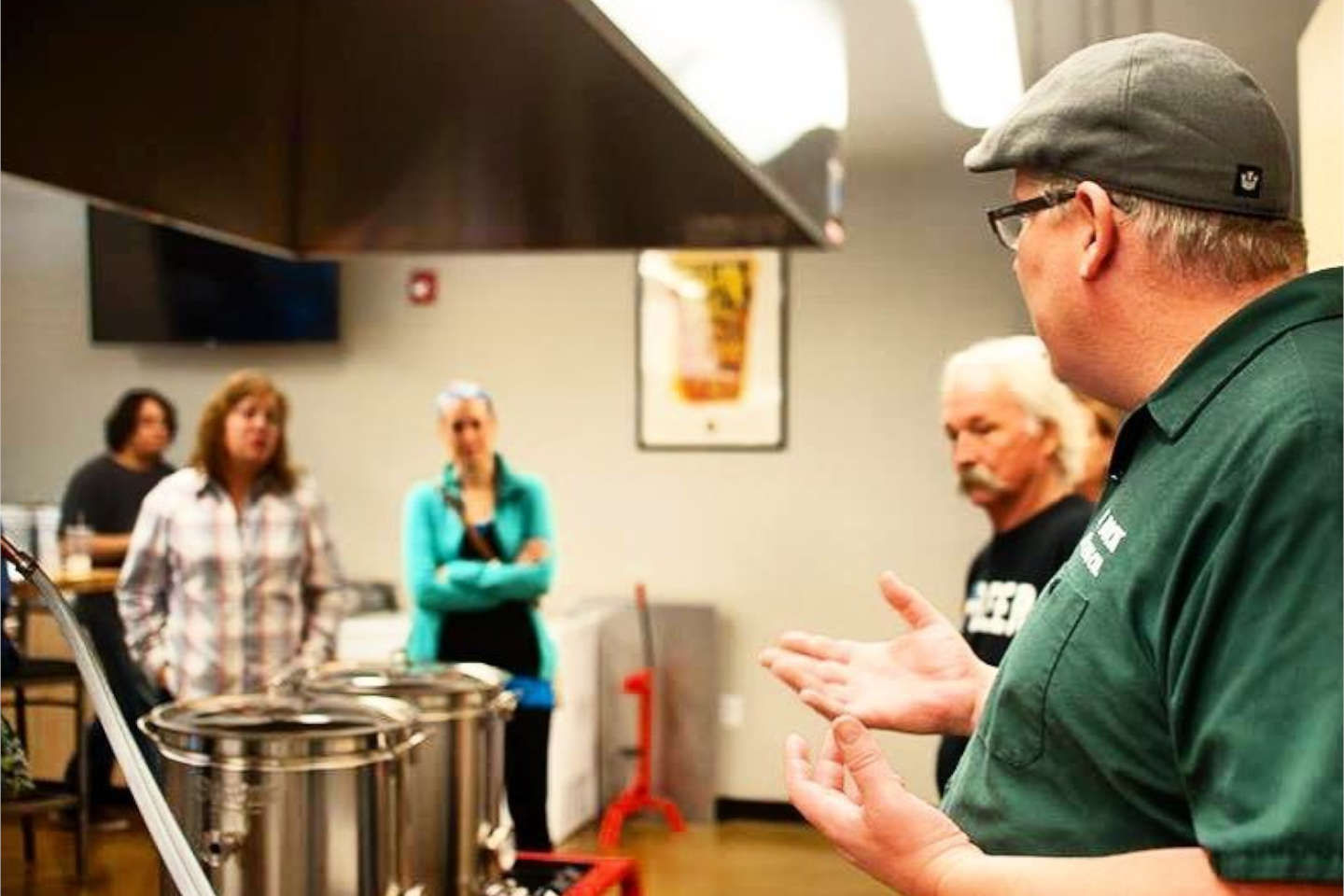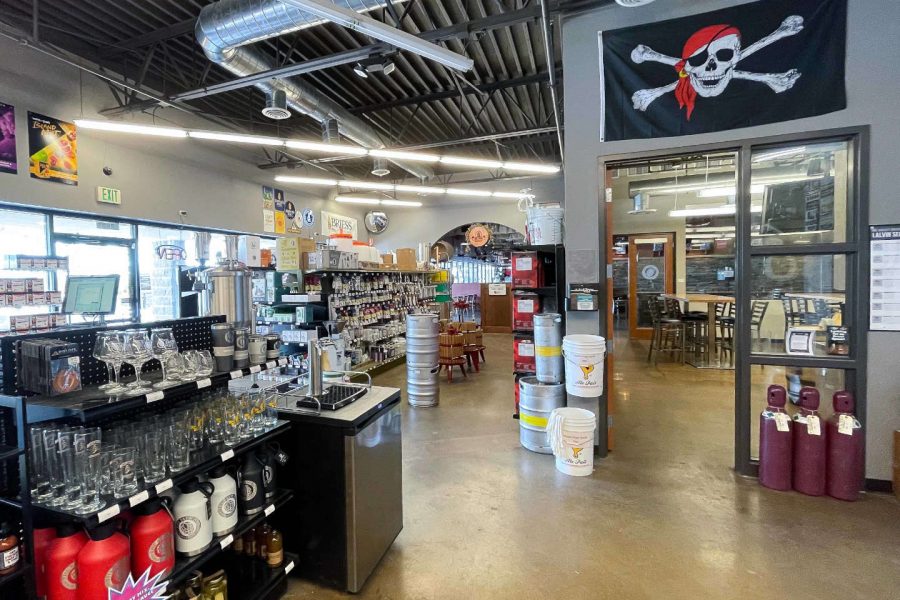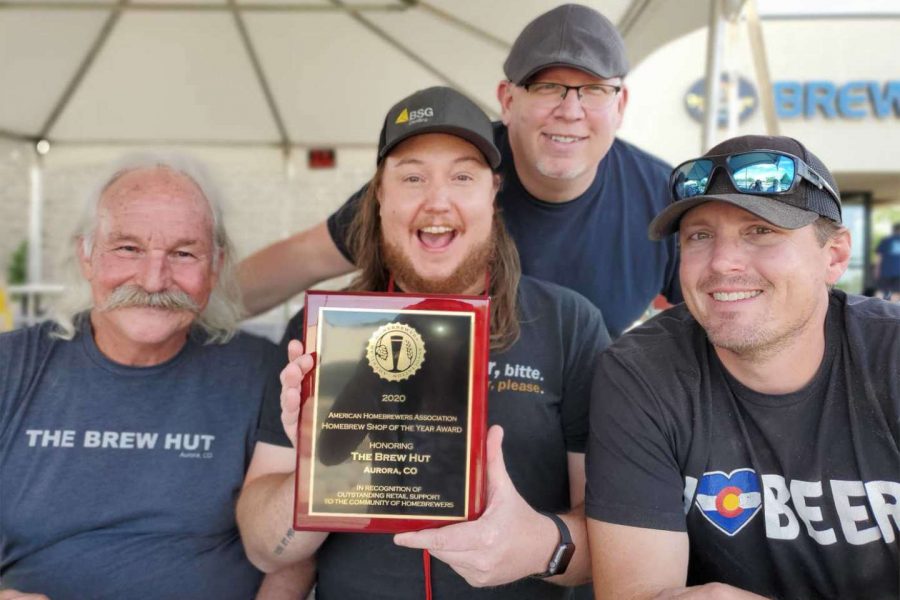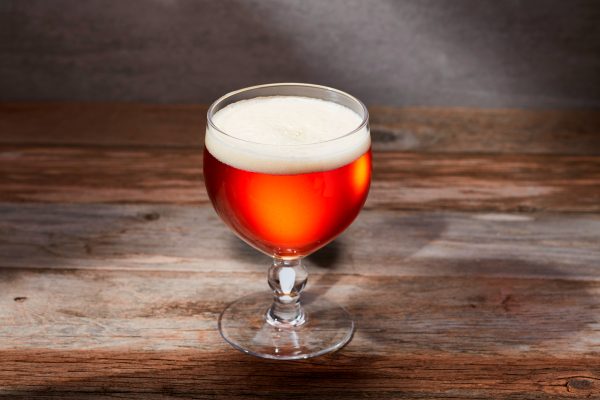
By Marty Jones
When he founded The Brew Hut in 1995, Scott Newcomb could not imagine the future of his homebrew supply shop or America’s DIY beer movement. “Who would have ever known that homebrewing would become what it is today?” Newcomb wonders. Equally hard to imagine was the impact that his Aurora, Colorado, store would have on the homebrewed and craft-brewed beer cultures of Colorado.
But on June 26, The Brew Hut will celebrate that beery influence with its 25th/26th anniversary party. (Last year’s 25th got dropped due to COVID-19.) The party will include a “mini beer fest” that will present beers from six local craft brewers who got their starts in beer as customers at The Brew Hut. The list includes Kevin DeLange, a Brew Hut customer who purchased the shop from Newcomb in 2002 (with his then wife and current business partner, Michelle Reding) and then launched Dry Dock Brewing Company (in 2005) in the adjoining strip-mall space next door.
Newcomb opened The Brew Hut out of frustration with the limitations in ingredients and equipment at the homebrew shops then in the Denver metro area. “My plan was to open a larger ‘one-stop brew shop’ that had about everything that was available for homebrewing at the time,” Newcomb recalls. The owners of many of his peer shops attended his grand opening. “About every one of them said my store was too big and I would be out of business in a year,” he says. “Here it is 26 years later and the store is stronger than ever thanks to Kevin and Michelle.”
When the pair opened the Dry Dock brewery next door, they did so with a novel approach (suggested by Newcomb) that proved helpful to The Brew Hut and the new brewery, one that is now ubiquitous in craft beer: a manufacturing brewery that sells all of its beer by the glass to onsite customers. “This was a new concept at the time,” DeLange recalls. “We opened the first tasting-room-model brewery in Colorado.”

The concept meant Dry Dock customers could buy a pint, carry it into the adjoining Brew Hut, and then pick up a recipe and the ingredients for making that beer at home. “We were sort of a speakeasy,” DeLange recalls. “In our first six months, about half of our production went into kegs brought in by our homebrewing customers.”
One of those customers was Dave Bergen. He and two of his homebrewing friends made the jump from extract to all-grain brewing when they became Brew Hut customers in 2009. The three brewed beer together once a week for five years, perfecting recipes with advice and unflinching feedback from staff at The Brew Hut and Dry Dock. In 2014, the trio became friends and business partners when they opened Joyride Brewing in nearby Edgewater, Colorado.
“We wouldn’t be here if it weren’t for The Brew Hut and all of the help and mentoring the staff gave us,” Bergen says. At the anniversary bash, Joyride’s founders will serve two beers (a West Coast IPA and a Kölsch) made from recipes from their days as Brew Hut customers.
“We don’t have an official count of craft brewers who got their start by buying supplies at The Brew Hut,” DeLange says, “but I think it’s around 25. I continually see brewers at beer festivals, GABF, and the Craft Brewers Conference that remind me of how they started brewing with us. It’s always very gratifying to hear that.”

DeLange and Reding have enjoyed their own Brew Hut–fueled success as craft brewers. Dry Dock now has a second and much larger production facility (also with its own tasting room), beers (including a popular Apricot Blond Ale) sold across the state, and an impressive collection of GABF and World Beer Cup medals. The pair has also guided The Brew Hut through nearly twenty years, including tough ones in the early days and a pandemic year with hearty sales growth. Last year, The Brew Hut also earned the 2020 Homebrew Shop of the Year Award from the American Homebrewers Association.
And while Newcomb is no longer in the homebrew business, he’s still deep in the at-home zymurgy he began evangelizing over a quarter of a century ago. “I make beer at home as often as I can,” he says. “Right now I have my award-winning brown ale on tap, and a lemon wheat and a red ale in the secondary fermenter. I enjoy this hobby today as I much as I did the first time I ever brewed beer,” he adds. “I still get excited on brew days and can’t wait to taste my homebrew and share it with others.”
About the author: Marty Jones is a longtime craft beer journalist, promoter, and publicist. He lives in Denver, Colorado and helps Dry Dock Brewing with its flag-waving efforts. All photos in this article attributed to Julia Gorrell.



Share Post